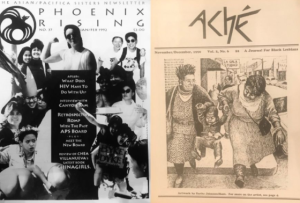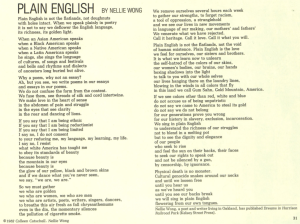Asian American activists like Yuri Kochiyama often befriended eminent African American activists such as Malcolm X, and strengthened intersectional bonds that served both communities. Kochiyama, Richard Aoki, and Mo Nishida were inspired and educated by the activism of Black radical groups. Because the interconnections within Asian American activist groups were hindered by political and “internal contradictions,” their cooperation with Black communities was “more important than any genealogical linkage” (Fujino 57). In their development towards oppositional consciousness, Japanese Americans established close proximity to Black communities in consequence of residential segregation and post-war restrictions. As such, Asian American activists, especially feminists, developed a foundational political consciousness, thus contributing to solidarity between Asian and Black communities.

Covers from the Phoenix Rising and Aché periodicals, featured in “Exploring Black and Asian American Lesbian Archives: Aché and Phoenix Rising”
Conferences hosted by groups of various radical subgroups helped unite minority communities: “From October 12 to 14, 1979, queer Asians from across the U.S. participated in the first National Conference of Third World Lesbians and Gays in Washington, D.C.” (Swift). Howard University, a historically Black college, hosted this conference in which the attendees included the Combahee River Collective, an eminent Black feminist coalition, and the Salsa Soul Sisters, a leading group of lesbian feminists of color.
Aché, a journal for Black lesbians, further contributed to cross-racial solidarity as they collaborated with women of other ethnicities. The November 1990 issue of “Aché documented I Am Your Sister: Forging Global Connections Across Differences, a four-day conference in honor of [Audre] Lorde…” (Swift). The conference, which was held in Boston in October 1990, garnered roughly 1,200 women from 23 countries. In accordance with Lorde’s foundational principles of intersectionality, Asian American women “took to the podium to express their grievances of being stereotyped, overlooked, and discriminated against in society” (Swift). Women of color are subject to discrimination on various scales, and their experiences manifest differently across communities. During the conference, a group of twelve women shared their experiences as Asian Americans in the U.S. and broke through the ignorance of other women of color as they spoke of orientalism, indoctrination, and fetishization. In turn, Black and Chicana women shared their individual experiences, facilitating an environment of education and empathy.

“Plain English” by Nellie Wong published in Heresies: A Publication on Feminist Art and Politics
Nellie Wong, an Asian American poet, expresses the aforementioned principles and unites women of color in her poem, “Plain English.” Wong unifies women of color under the pronoun, “we”, to demonstrate how the isolating and dehumanizing experience of assimilating into white society, is common among “yellow, black and brown skins” (31).
Sources:
Fujino, Diane C. “Race, Place, Space, and Political Development: Japanese-American Radicalism in the ‘Pre-Movement’ 1960s.” Social Justice, vol. 35, no. 2, Social Justice/Global Options, 2008, pp. 57–79.
Wong, Nellie. “Plain English.” Heresies: A Feminist Publication on Art and Politics, vol. 4. no. 3, 01 Jul. 1982, pp. 31.
Swift, Jaimee. “Exploring Black and Asian American Lesbian Archives: Aché and Phoenix Rising.” Asian American Writers’ Workshop, The Margins, 25 Mar. 2021. https://aaww.org/exploring-black-and-asian-american-lesbian-archives-ache-and-phoenix-rising/. Accessed 07 Dec. 2021.
